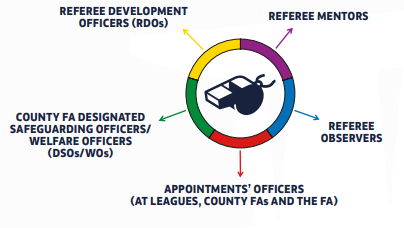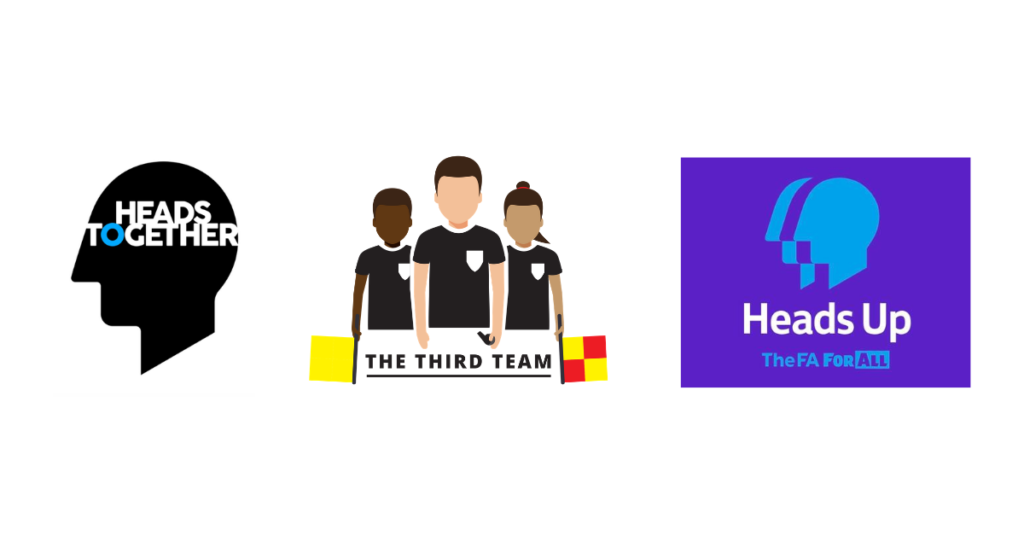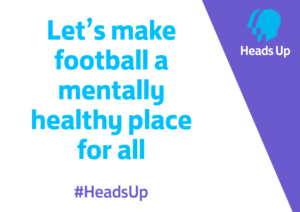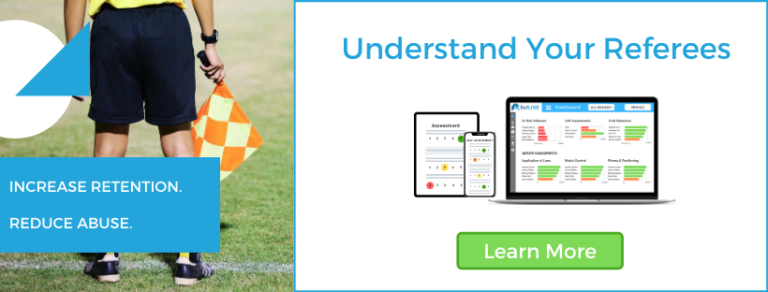On Saturday 1st of August, the Heads Up FA Cup Final will take place. This year the commercial sponsor of the FA Cup has foregone its brand being attached to the event in support of the Heads up initiative devised by the Heads Together charity. This supports the ongoing commitment from The FA to tackle mental health challenges faced by participants in all capacities within football and the drive to use the game as a force for good. In this vein, members from all sides of the football family came together at the beginning of the week prior to the cup final to sign the ‘Mentally Healthy Football’ declaration, committing to building a mentally healthy culture at all levels of the game, now and for future generations.
Leaders of clubs, leagues, and organisations across the whole of the UK football family put pen to paper on the Mentally Healthy Football declaration which has been designed to see that football recognises that mental health is just as important as physical health. This ground-breaking declaration means that for the first time there is a collective ‘game plan’ to ensure the mental health of players, staff, managers, coaches, and officials is prioritised across the sport.
Additionally, this declaration is a commitment from the football authorities to continue to raise awareness on mental health, and to establish an environment in the UK where players, staff, managers and officials are more aware when someone they know may be struggling and are encouraged to look after their mental health just as they do their physical health.
“Not only will the declaration benefit future generations who work and play within the game, but it will also send a clear message to football’s millions of fans about the importance of mental health. That is a legacy we can all be proud of – following a season we will never forget.” – The Duke of Cambridge, Founder of Heads Together & Creator of The Heads Up Campaign
What Does This Mean For Referees?
Referees come in all shapes, sizes, genders, sexualities, races and religions. The majority of referees in the UK are men and they fall into the 15-49 year old age category, this is also the age bracket for which suicide is the leading cause of death. However, women are, statistically, three times more likely to experience a mental health challenge than men. 50% of all mental health challenges are established by 14 years old (the age at which referees in England can qualify). This rises to 75% by the age of 24. This means that we need to monitor ourselves and our colleagues as we transition from our teenage years to young adulthood.
“There are over 28,000 registered referees in this country. Each year, several thousand are recruited and trained but similar numbers also decide to quit officiating. There are a variety of reasons for this but we do know that some who decide to stop have a mental health problem which contributes to them feeling unable to commit to refereeing. The right support can help these referees through the tough times and back to refereeing. Even better, that support can help prevent referees quitting in the first place.” – Richard Glynne-Jones, National Referee Manager, The FA
The FA have produced this graphic, which you can see below. This is an excellent tool referees can refer to when they are concerned about their own welfare or that of a colleague showing signs of an impact around wellbeing. With the knowledge of which members of staff can be of assistance anyone in refereeing can make an informed choice about the best person to speak to.

Monitoring Your Mental Wellbeing
Your mental wellbeing is crucial to your ability to function as an official. There are many things that may change within your approach as a referee if you begin to experience mental ill-health, these could include:
- Reducing your availability and/or withdrawing from appointments more frquently
- Reducing contact and/or communicating less with those around you in your refereeing and everyday life;
- Loss of motivation to attend training events/meetings;
- Negative changes in your demeanour/personality/appearance;
- Noticeable drop in focus/concentration;
- Higher than expected pre-match anxiety;
- Deterioration in your physical health/fitness;
- Loss of interest in refereeing overall/want to take a break;
- Frequent negative interactions/increased negativity;
- Lack of desire to interact with other officials pre-and post-match;
- Little/no interaction with other match officials at training events.
“Big changes in my life sent me on a downward spiral. Not knowing how to cope, I turned to try and take my own life. Football saved my life – a phone call from a club secretary confirming a game got me through the darkest hour of my life. “That game gave me the sense of purpose I needed to carry on. Refereeing is the thing that allows me to escape my own thoughts. For those 90 minutes, I am so focused on delivering on the pitch that my own thoughts don’t have the chance to spiral. My thoughts are solely on the game and the next decision I have to make. “Getting the professional help I needed was key to my recovery. At times the side effects of medication can be difficult to manage, but the benefits outweigh the negatives. Counselling and talking was also a massive help to my recovery. Seek help, talk about how you feel and you will be amazed about how many others have felt the same.” – Natasha Wilson, Referee Development Officer, Leicestershire and Rutland FA
What Can You do to Keep Potential Stress & Anxieties at Bay?
- Make sure you’re organised. Small things such as planning your journey, leaving on time and making sure you pack the right kit can make thing a lot easier. The message is, don’t leave anything until the last minute.
- Develop a go-to pre-match routine that you’re comfortable with. This means visualising specific situations such as: Meeting the coaches pre-match, dealing with players wearing incorrect kit and noting down key timings before the game.
- Make a plan to help deal with potential stressors. For example, consider the type of thing you may say or do if you are verbally abused by a parent or how you might deal with dissent from a coach.
- Take care of yourself by doing things such as: eating the right food, making sure you have enough sleep, exercising regularly or you may want to consider trying something new such as breathing exercises. The Mind website (mind.org.uk/information-support/tips-for-everyday-living/) is a great resource for getting ideas.
- Redirect your energy. Rather than focusing all your energies on refereeing, do something different and fulfilling such as spending more time with your friends and family and engaging in different activities.
- ‘Control the controllables’. Accept that there are some things you can’t change/influence, such as a low mark from an Observer or a club, and try not to worry about them.
- Rather than overthinking the things that are worrying you, you could consider writing them down and then making time to tackle them at a time when you’re more relaxed and focused.
- Put things into perspective. For most, refereeing is a hobby. Don’t be afraid to say ‘no’. If you feel like refereeing is having an adverse effect on your mental wellbeing.
- Develop your Self-talk. Have a set phrase or set of words to help you through potentially stressful situations in a match and to help you remain positive. This could be something as simple as “come on Colin/Susan” or even counting to 10 in order to reset your mind.
- Use association. If you feel down or anxious pre-match, listen to some music that you associate with happiness or positivity to boost your mood.
- Don’t scroll social media. What do you stand to gain from knowing what clubs think post-match?
“Unfortunately one of the forms of abuse referees face in our game is discrimination – negative behaviour rooted in their race, religion or gender. “We have to eradicate it if we are to halt referees dropping out of the game due to the treatment they sometimes receive. And of course, as in every walk of life, abuse can lead to a lowering of personal wellbeing. More positively, making it clear that discriminatory comments towards referees (as well as everyone) is unacceptable can help build our cohort of qualified referees and turn refereeing into the respected part of the game it deserves to be. “No self-respecting game of football should be played without a ref!” – Arran Williams, Northern Grassroots Officer, Kick It Out
How Can I Get Professional Help For Myself, A Family Member or Colleague?
There are many different support networks out there which you can access as a referee or in relation to your wider mental health. See the list below to find the support network most relevant to the different needs you may have.
Within Football:
- Contact your County FA to see if they are running any initiatives around mental health.
- The Referees’ Association (RA) is able to offer support and guidance: the-ra.org
- Ref Support UK provides the option to send them a message through their website (https://refsupport.co.uk/contact-us/) or for more urgent and serious matters they have a hotline: 0300 311 1966
General Information:
- Mind InfoLine: 0300 123 3393. The Mind Infoline can help find specialist services in your area.
- Mind website: www.mind.org.uk
- Every Mind Matters: visit www.everymindmatters.co.uk to get your free, online ‘Mind Plan’, designed to give you simple, personalised tips for a healthier mind.
Helplines & Listening Services:
- Samaritans: 24 hours a day, 365 days a year. Call 116 123 (free from any phone).
- SANEline: 0300 304 7000 (4.30pm–10.30pm every day).
- HeadsUp: For immediate support text HeadsUp to 85258 to chat by text to a trained and supervised volunteer. Free, confidential and available 24/7.
- CALM (Campaign Against Living Miserably): 0800 58 58 58 (5.00pm to midnight, 365 days a year). For more options, visit the Helplines Partnership website for a directory of UK helplines: www.helplines.org/helplines.
For more information on The FA’s mental health guidelines on mental health you can find the document here.
To find out more about the Mentally Healthy Football declaration and visit the Heads Together website click here.
At The Third Team I work individually and in collaboration with different professionals where I have developed workshops associated with Resilience and Mental Toughness Development to help referees. The workshops are interactive, where referees are encouraged to open up and share their experiences to help each other.
Feel free to contact me if you’d like to know more about my workshops and how I could help you or your officials.
Best Wishes,

Nathan Sherratt
Referee Educator & Managing Director of The Third Team

Nathan Sherratt
Nathan Sherratt, Referee Educator, Resilience Trainer and Managing Director of The Third Team. A Mental Toughness Practitioner based in County Durham, North East England.




